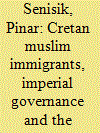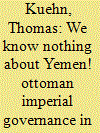|
|
|
Sort Order |
|
|
|
Items / Page
|
|
|
|
|
|
|
| Srl | Item |
| 1 |
ID:
121462


|
|
|
|
|
| Publication |
2013.
|
| Summary/Abstract |
This study is an attempt to shed light on the issue of Cretan Muslim emigration from Crete to the Ottoman Empire in order to analyse the multiple connections among the Ottoman state, immigrants and different localities in the Eastern Mediterranean in the late nineteenth century. Following the Cretan revolts of 1896 and 1897, the establishment of autonomous government on the island of Crete and the withdrawal of Ottoman armies from the island, Cretan Muslims began to emigrate from Crete to various places in the Ottoman Empire. Specifically, this article aims to deal with the migration of Cretan Muslims and to focus mainly on the year 1899, during which large numbers of Muslims were forced to leave their homes. The article suggests that Cretan Muslim emigration provides a good case for understanding the attitudes and policies of the Ottoman state towards migration, and the relationship between the state and immigrants, as well as for analysing the broader connections between Crete and the other localities of the Eastern Mediterranean. The working hypothesis is that in order to understand certain socio-political and demographic changes and transformations experienced within the Ottoman Empire in the late nineteenth century, it is important to study the issue of Cretan Muslim immigration to Ottoman Anatolia. This presents an opportunity to investigate certain questions with regard to the dynamics of migration and also to discuss certain facts associated with migration within the late imperial context.
|
|
|
|
|
|
|
|
|
|
|
|
|
|
|
|
| 2 |
ID:
142778


|
|
|
|
|
| Summary/Abstract |
This article presents an analysis of the European Union and of the integration process using the concept of empire. It also offers a critical reflexion on the use of the concept of empire to analyse contemporary polities. It argues that many scholars of politics have a biased understanding of this concept, which is ‘tailored’ to analyse only one type of empire, the colonial empire, and to disregard the existence of another type of empire. To escape this trap, the article suggests the use of two concepts, ‘inwards imperial governance’ and ‘outwards imperial governance’. These concepts make it possible to account for different types of empire in the past as well as contemporary polities. They also help shed a different light on the EU’s empirehood and its evolution over time. In its concluding remarks, the article suggests the potential usefulness of these concepts for the analysis of other contemporary cases.
|
|
|
|
|
|
|
|
|
|
|
|
|
|
|
|
| 3 |
ID:
134406


|
|
|
|
|
| Summary/Abstract |
An important political consequence of the crisis of capital in the 1970s has been an increasing intensification of informal imperialism within Africa. This paper argues that the advanced capitalist countries again confronted the endemic problem of overcapacity alongside a decline in the rate of profit and that the major neoliberal reforms foisted upon the African continent were part of the spatio-temporal fix that followed. The quotidian management of many African states was not an intended consequence of structural adjustment, but the subsequent perturbations that beset many developing countries after following such policies has led to such a degree of institutional instability that a new form of imperial governance has come into being. Juridical sovereignty has been maintained, but political sovereignty has been severely compromised through the emergence of this neo-imperial governance. Today an array of external actors is embedded in the sinews of these states, setting the general parameters of state policy to such an extent that one can no longer speak of these countries as possessing de facto independence. The rise of these so-called ‘governance states’ and the new emphasis on ‘governance with government’ constitute a new non-territorial, political form of imperialism.
|
|
|
|
|
|
|
|
|
|
|
|
|
|
|
|
| 4 |
ID:
163830


|
|
|
|
|
| Summary/Abstract |
This article analyzes changing concepts and practices of knowledge production and governance in the Ottoman Province of Yemen from the re-conquest of the Yemeni highlands in 1871–3 to the beginning of the First World War. It argues that, while Ottoman bureaucrats embraced modern governmentality by emphasizing the connection between local knowledge and effective governmental control, the production of knowledge about the political, social, cultural, and economic realities of southwest Arabia during this period cannot be reduced to acts of writing and the creation of government archives. While historians of the late Ottoman Empire have often suggested that knowledge production –– like other elements of imperial governance during the period under study –– became increasingly systematic and informed by bureaucratic rationality, I argue that in fact personal relations and oral communications remained the hallmarks of Ottoman knowledge production in Yemen until the early twentieth century. This began to change when the near collapse of Ottoman rule in Yemen in 1905, the end of the Hamidian regime in 1908–09, and new notions of professionalism prompted officials to view existing practices of knowledge production and transmission as partly responsible for the government’s failure to control this province. Now, they increasingly associated authoritative knowledge with published, scholarly accounts, while considering unrecorded knowledge unreliable.
|
|
|
|
|
|
|
|
|
|
|
|
|
|
|
|
|
|
|
|
|